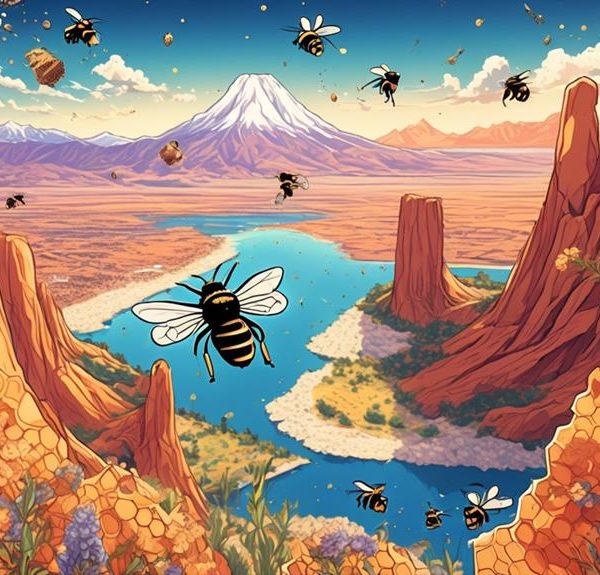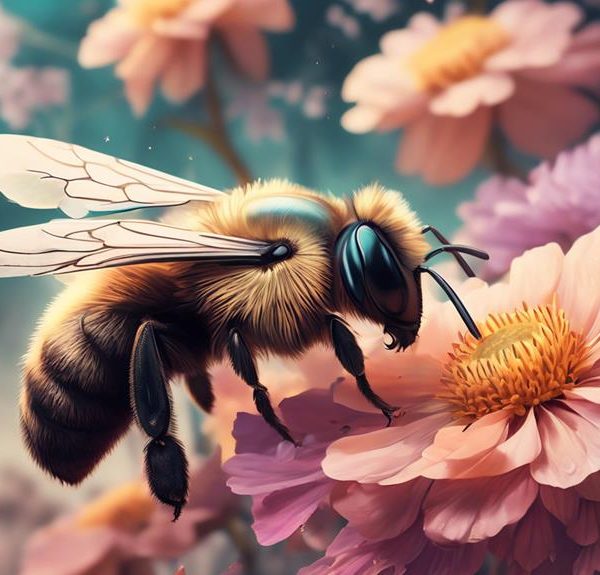Keep reading to unravel whether Mason bees are native to Washington State, impacting not just entomology but local ecosystem health.
Are Mason Bees Native to Washington State?
You know what they say, 'You can't judge a book by its cover,' and this couldn't be truer when it comes to the intriguing case of Mason bees in Washington State.
You might be wondering, are these industrious little creatures truly native to the Pacific Northwest, or are they just opportunistic immigrants who've made themselves at home in the Evergreen State? That's a question that's not only relevant to amateur naturalists and professional entomologists, but also to anyone interested in the health and diversity of our local ecosystems.
Stick around, because we're about to take a closer look at what science can tell us about these buzzing enigmas.
Key Takeaways
- Mason bees are native to Washington State and thrive in its diverse habitat.
- They are solitary bees that nest in pre-existing holes in wood or hollow stems.
- Mason bees are excellent pollinators and play a vital role in the ecosystem by contributing to biodiversity and promoting plant growth.
- Approximately one-third of food relies on pollinators like Mason bees, highlighting their importance in agricultural systems.
Understanding the Mason Bee
You might be surprised to learn that the Mason Bee, native to Washington State, is a solitary species, making its unique contributions to local ecosystems without the social structure commonly associated with honeybees. Unlike their honeybee counterparts, Mason Bees don't form large colonies or produce honey. Instead, each female bee is fertile and constructs her own nest, often in pre-existing holes in wood.
Mason Bees are renowned for their exceptional pollination abilities. They're more efficient than honeybees due to their hairy bodies, which easily pick up pollen. They also have a broader range of flowers and plants they can pollinate, including fruits, vegetables, and native plants.
Your understanding of these bees wouldn't be complete without appreciating their crucial role in the environment. They help to maintain biodiversity by pollinating a wide variety of plants, thereby aiding in seed production and plant propagation.
However, these bees face threats from habitat loss and pesticides, which can harm their population. It's vital, therefore, to understand their ecological importance and to support their conservation. Through this understanding, you can contribute to the preservation of these unique, industrious insects and their essential role in Washington's ecosystems.
Mason Bees in the United States
While Washington State provides a compelling case study, it's essential to widen our scope and examine the role and status of Mason Bees across the United States. You'll find that Mason Bees aren't just native to Washington; they're spread across different regions in the U.S.—from the East Coast to the West Coast, and even the Midwest.
Let's delve into the specifics. Here's a table that succinctly summarizes some key facts about Mason Bees in three different regions:
Region | Common Mason Bee Species | Key Role in Ecosystem |
|---|---|---|
East Coast | Osmia lignaria | Pollination of flowers and crops |
Midwest | Osmia taurus | Pollination, particularly of fruit trees |
West Coast | Osmia californica | Pollination of wild plants and commercial crops |
You can see that each region has its unique species of Mason Bees, all playing the crucial role of pollination. It's interesting to note how these bees adapt to their regional conditions, contributing significantly to biodiversity and food production. Thus, understanding the distribution and role of Mason Bees across the United States can help in their conservation and in maintaining ecological balance.
The Habitat of Mason Bees
Inhabiting a diverse range of environments, Mason Bees are solitary creatures that prefer to nest in small cavities often found in wood or hollow stems. Unlike honeybees that live in large colonies, these industrious insects lead a solitary existence in their native habitats.
You'll often find Mason Bees in meadows, orchards, and forested areas, where they can easily access a variety of flowering plants. They're also adaptable and can thrive in urban environments, provided there's a sufficient supply of flowers for nectar and pollen.
The nesting sites of Mason Bees are quite unique. They use mud to build partitions within their nests, which is why they're often found near damp soil. Each individual cell within the nest is filled with pollen and a single egg before being sealed with a plug of mud.
Though they're well adapted to a variety of climates, Mason Bees are particularly sensitive to temperature and humidity levels. They require a cold winter for their eggs to develop properly, which is why they're commonly found in temperate regions.
In Washington State, the presence of Mason Bees is a testament to the state's diverse habitats and rich biodiversity.
Mason Bees in Washington State
Washington State, with its broad range of ecosystems, offers an ideal environment for Mason Bees, providing diverse nesting sites and abundant flowering plants for these solitary pollinators. You'll find that these industrious insects aren't your conventional bee species. They don't live in hives; instead, they nest in pre-existing holes in wood or hollow stems, making them a key species in your garden's ecosystem.
Observing these bees closely, you'll note unique behaviors. Unlike honeybees, they're solitary, with females independently building and provisioning their nests. You'll also find them to be excellent pollinators, as they carry pollen on their abdomen, which effectively transfers to flowers as they forage.
Their prevalence in Washington State is due, in part, to the region's diverse flora. The bees' active period coincides with the flowering of many native plants, providing a rich food source. This synchrony is a testament to their adaptability and the reciprocal relationship they've developed with their environment.
In essence, Washington State's unique ecological conditions provide a haven for Mason Bees, underpinning their vital role in pollination and biodiversity. Understanding their behavior and habitat preferences can aid in conservation efforts, ensuring their continued presence in the region.
Importance of Mason Bees in Ecosystem
Undoubtedly, Mason Bees play a crucial role in maintaining the ecological balance of our environment, acting as prolific pollinators and contributing significantly to biodiversity. You'll find these miniature marvels darting between flowers, transferring pollen grains in a process that's vital for plant reproduction. Compared to honeybees, they're far more efficient pollinators, and they're less susceptible to diseases and parasites.
Their presence in an ecosystem can boost the growth of plants, which in turn provides sustenance for other wildlife in the food chain. They're not just beneficial to other species; they're critical for us, too. Approximately one-third of the food we consume relies on pollinators like Mason Bees.
Moreover, their nesting habits promote soil health. They lay their eggs in small cavities and seal them with mud, which aids in soil aeration and nutrient cycling. It's clear that Mason Bees are indispensable cogs in the ecological machine.
Nevertheless, Mason Bees face threats such as habitat loss, pesticides, and climate change. It's essential we understand their importance and take measures to safeguard their survival. By doing so, we'll ensure the continued functioning of our ecosystems and the wellbeing of our planet.
Conclusion
Indeed, Mason bees are native to Washington State, thriving in its diverse habitats. These industrious pollinators significantly contribute to the health of the local ecosystem. Their presence boosts plant reproduction, enhancing biodiversity.
However, their population is declining due to habitat loss and pesticides. Thus, it's crucial we take measures to protect and encourage their growth. After all, the survival of these small creatures greatly impacts our environment's stability and prosperity.



